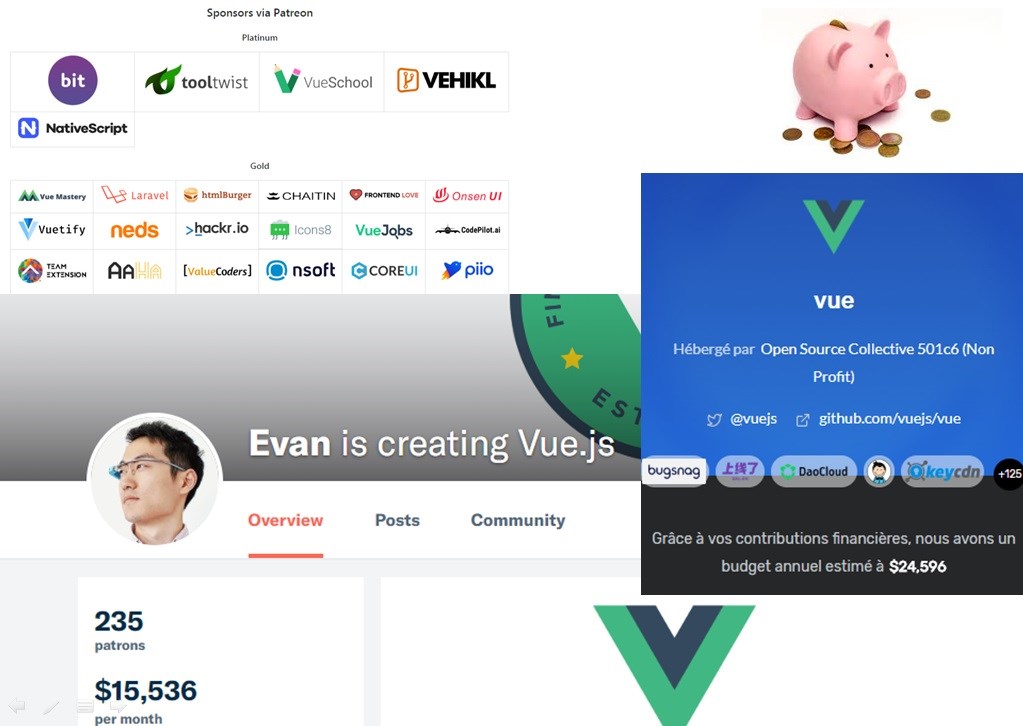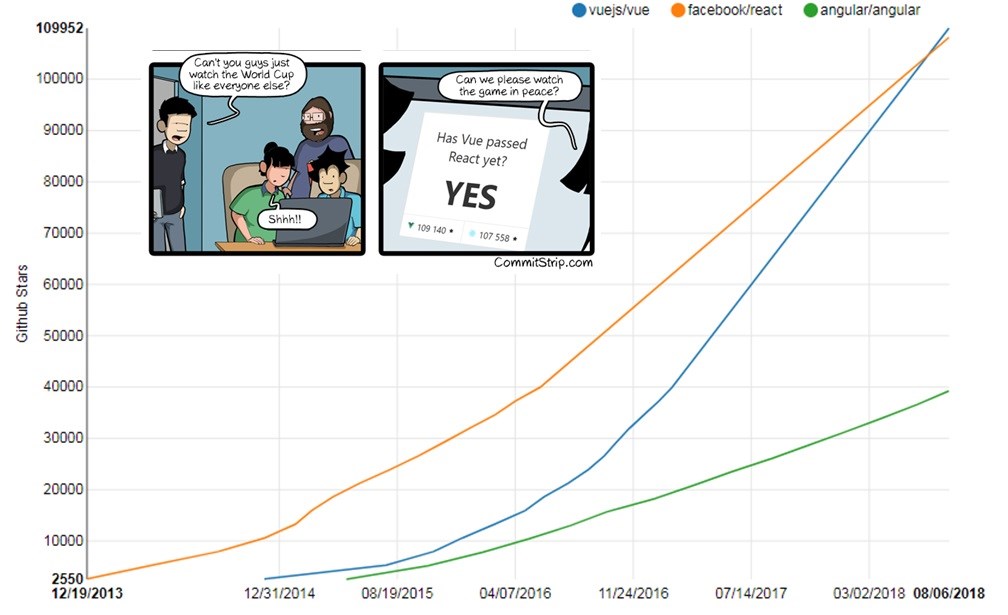# Presentation of Vue.js
# What is Vue.js?
Vue (pronounced /vjuː/, like view) is a progressive framework for building user interfaces. Unlike other monolithic frameworks, Vue is designed from the ground up to be incrementally adoptable. The core library is focused on the view layer only, and is easy to pick up and integrate with other libraries or existing projects. On the other hand, Vue is also perfectly capable of powering sophisticated Single-Page Applications when used in combination with modern tooling and supporting libraries.
# History
Vue.js was created originally by a single person, Evan You, a former Google engineer who used to work on Angular.js and later on the Meteor framework. After experimenting with a reactivity system that he thought was better than the one used in Angular.js, he decided to publish his first results in July 2013. Five years later, Vue.js is the third project on Github in number of stars and Evan holds one conference after the other around the world.

# Development team
The development of Vue and its ecosystem is guided by an international team of about thirty voluntary members. The team is spread all over the world, which helped to make the framework popular worldwide. Thus it is easy to have support no matter your timezone.

https://vuejs.org/about/team.html (opens new window)
# Business model and funding
Unlike React or Angular which are respectively supported by Facebook and Google, Vue.js is utterly independent and completely driven by the community. It is therefore the interests of the community that take precedence for steering the project and the technology roadmap to follow.
However, this raises the issue of funding. Many contributors are volunteers, but as a response to the growing popularity of the framework, many have left their job or have gone part-time to work on Vue. To compensate, they rely on sponsorship and individual donations through services such as Patreon. Thanks to the success of the framework, Evan and his team now have enough financial support to work full time on Vue, but also to organize conferences around the world. And the sources of the donations are varied enough to preserve the independence of the framework.

https://vuejs.org/sponsor/ (opens new window)
# Popularity
Vue.js has broken records in terms of popularity. It is now one of the top projects in number of stars on Github. Despite the lack of funding, many meetups and conferences have been self-organized in different countries. This is one of the most resounding successes of 2015-2016 in the open-source world.
The secret of his success? A focus on simplicity, a very low learning curve, an excellent documentation and a listening community.

# Comparison between the frameworks
Let's try to compare Vue with the other two most popular JS frameworks, React and Angular.

# Similarity between these 3 frameworks:
- Very popular, used by top companies
- Mature, stable, funded long-term support
- Component oriented codebase
- Mostly declarative and not imperative paradigm
- Suitable for modern technological stacks (ES6+ / TypeScript)
- Large ecosystem of components and tools
# Product positioning / self-description

React, Vue and Angular position themselves in different categories, this can be observed from the first lines of their introduction. React is defined as a library, independent of the technical stack. Angular is defined as the one framework for all needs, desktop and mobile. While Vue is caught in the middle, defined as a progressive framework, versatile and incrementally adoptable. A perfect middle ground between a library and a fully equipped framework.
# Language, programming style and technical stack
| React | Vue.js | Angular | |
|---|---|---|---|
| Language | JSX, optional support of TypeScript | Optional support of JSX and TypeScript | TypeScript |
| State management | Immutable centralized state (Flux) | Optional centralized state (Vuex) or internal mutable state | Internal mutable state , no official centralized state |
| Reactivity | Manual (setState + VDOM diffing) | Automatic (observers/Proxies) | Automatic (Zones/dirty-checking) |
| Stack | Not self-sufficient, to combine with complete web stack. Rich ecosystem. | Some official tools maintained by the core team. Third-party solutions are promoted if appropriate. | Full-stack framework sef-sufficient with built-in security features. Complete but less open. |
# Comparison in metaphor


- Does one thing but does it very well
- Not for everyone
- Innovative and disruptive
- Make sure you have spare parts
- Accessible and easy to handle
- Familiarity with use
- Efficient quickly, can be less sustainable over time
- Fairly conventional, big tuning potential
- Fully equipped with all options
- Heavyweight category
- Slower at startup, sustainable over time
- Out-of-the-box spare parts harder to find on the market
# Vue 3 or Vue 2 ?
The 3.0 version of the core library of Vue has officially been released as of 18 September 2020, and Vue 2 will be officially no longer supported on December 31th 2023. So we propose this training session for Vue 3 exclusively.